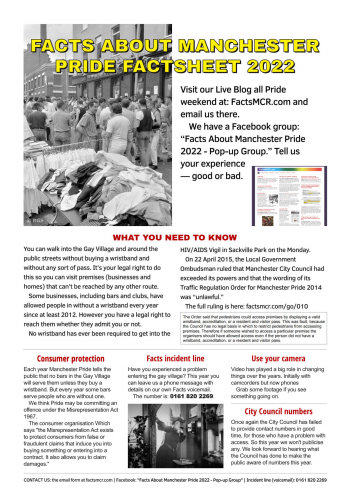

A brief history | Factsheet | Articles | Live blogs | Videos | Contact

A brief history | Factsheet | Articles | Live blogs | Videos | Contact
Updated on: 14 December 2021
This page explains how this website uses cookies and about the information we gather.
WHAT ARE COOKIES?
Cookies are small pieces of text information that a website or advertiser asks your web browser to store on your own computer. Nearly all sites store cookies in this way.
If you leave a comment under an article, the details that you entered into the form for nickname, email and website will be stored in a cookie on your own computer. This saves you from having to enter the data again in future.
Our site uses cookies to improve your experience as you browse the website.
By asking your browser to store a cookie that records where on the web you found this website, or which sections of the site you have already viewed, we can show you content that is fresh and more relevant.
Cookies can't carry viruses or install malware.
HOW CAN I REMOVE COOKIES?
You can delete them at any time and some web browsers let you turn off cookies completely.
Google Chrome, Chromium Portable or SlimJet: click the spanner, cog-wheel or box with lines in the top right corner, choose Settings, then in the left column click History. Click the Clear Browsing Data button and tick the cookies box (and anything else you want to delete). Then hit Clear Browsing Data. A shortcut is to press the keys control, shift and delete together to bring up the window.
Firefox: go to the Tools Menu and choose Options. On the Privacy tab, Show Cookies. A shortcut is to press the keys: control-shift-delete.
Internet Explorer 8: go to the Safety menu, choose Delete Browsing History, tick the Cookies box and click OK to delete them. A shortcut is to press the keys control, shift and delete together.
Opera: click the red Opera logo at top left, choose Basic in the left column and look under Privacy and security.
THIRD PARTY ADVERTISEMENTS
Currently we don't show any third-party ads on this website.
SERVER LOGS & THIRD PARTY ANALYTICS
Currently we don't use any third-party analytics services to track visitors. Nearly all websites store data about visitors in server logs and we do the same. The data is stored on the web server which hosts the website and for up to 12 months, but sometimes is deleted sooner.
The data includes an IP address — a unique number that is linked with an internet connection. Other details may include: the website a visitor came from (eg. Google), the pages they viewed, how long they spent on the site, which country they're in and the size of their screen.
This helps us to improve the content on our site. For example, if we see that a sizeable percentage view the site on a small mobile phone screen, we may decide to introduce pages that work better for them.
You are not personally identifiable to us purely from the data that is stored in the server logs.
PRIVACY OF THE ABOVE DATA
The only people with access to this data are the webmaster of the site and the technical staff of the web hosting company.
Ordinarily, no details that might help identify a visitor would ever be shared with a third party. An exception could be if a person was involved in posting abuse, attacking the hosting server or other illegal activities.
The logs are stored in a part of the web server that is password-protected. Currently the server is located in the United States.
QUESTIONS & COMMENTS
Questions regarding this privacy statement, or any other aspect of our website can be sent by email using our contact form.
 Our 2022 Factsheet (PDF) about Manchester Pride is available. This and factsheets from previous years give all the information you need. Read about your right to access the Gay Village without buying a wristband, history & opinion.
Our 2022 Factsheet (PDF) about Manchester Pride is available. This and factsheets from previous years give all the information you need. Read about your right to access the Gay Village without buying a wristband, history & opinion.
Download the PDF version.
And here it is as two images (handy for sharing on social media): page 1 | page 2
Our factsheet from 2021 is still well-worth a look. It has four pages of facts, gossip and fun. Download it as a PDF here. See our factsheets page for other years.
The ruling by the Local Government Ombudsman in April 2015 (PDF). The Ombudsman decided that Manchester City Council had exceeded its powers by mentioning wristbands in a traffic order and that it was unlawful to restrict access to premises (businesses and homes).
Minutes of a meeting at Marketing Manchester in November 2002. These show that those present were told they couldn't charge people to enter public streets. However some of them went ahead and did so from 2003 onwards for a decade.
At the meeting were: Manchester City Council, GHT, the LGF (now known as the LGBT Foundation), Marketing Manchester, the organisers of Europride 2003. The advice seems to have come from the police. Yet the police apparently then turned a blind eye...
This document was unearthed at the Library Archives quite recently by a FactsMCR campaigner.
Since the ruling by the Local Government Ombudsman in 2015 the media — both LGBT and mainstream — have stayed silent about the decade-long wristband fiddle and your rights. So some people continue to pay unnecessarily.
All your favourites know: GayStarNews, Pink News, Manchester Evening News, The Guardian, BBC and many more. In a letter to us, the BBC defended its journalist right not to report this. The same BBC that championed consumer rights at one time now prefers to cosy up to the civil-rights-infringing Manchester Pride, as a "sponsor" (the BBC says it doesn't give money).
These organisations don't need to lie. They simply ignore an issue completely. Or, they report some of the facts; perhaps popping in just one or two bits they don't like, to add a fake impression of balance. That's how they manipulate opinion in the direction they think it should go.
The veteran ITV reporter John Pilger says that "not reporting" is the most powerful form of censorship.
What else aren't they telling us?
© Copyright 2026. All Rights Reserved. | Cookies, Privacy & Data